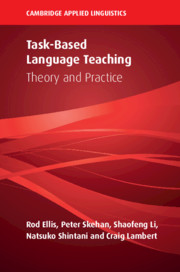Book contents
- Task-Based Language Teaching
- The Cambridge Applied Linguistics Series
- Task-Based Language Teaching
- Copyright page
- Contents
- Figures
- Tables
- Series Editors’ Preface
- Authors’ Preface
- Part I Introduction
- Part II Theoretical Perspectives
- Part III Pedagogical Perspectives
- 7 Task-Based Syllabus Design
- 8 Methodology of Task-Based Language Teaching
- 9 Task-Based Testing and Assessment
- Part IV Investigating Task-Based Programmes
- Part V Moving Forward
- Endnotes
- References
- Index
9 - Task-Based Testing and Assessment
from Part III - Pedagogical Perspectives
Published online by Cambridge University Press: 07 October 2019
- Task-Based Language Teaching
- The Cambridge Applied Linguistics Series
- Task-Based Language Teaching
- Copyright page
- Contents
- Figures
- Tables
- Series Editors’ Preface
- Authors’ Preface
- Part I Introduction
- Part II Theoretical Perspectives
- Part III Pedagogical Perspectives
- 7 Task-Based Syllabus Design
- 8 Methodology of Task-Based Language Teaching
- 9 Task-Based Testing and Assessment
- Part IV Investigating Task-Based Programmes
- Part V Moving Forward
- Endnotes
- References
- Index
Summary
Chapter 9 begins by reviewing some general issues in testing - the different functions of tests (proficiency, achievement, diagnostic), summative and formative evaluation, norm versus criterion referencing and washback. It then outlines the theory of testing that underlies task-based assessment, arguing that it must take account of both competences (e.g. grammatical, sociolinguistic and strategic) and the ability to use language. It compares the interactive approach and the real-life approach to assessment. It discusses the challenge facing task-based assessment, namely how tasks can provide evidence of learners’ ability to use an L2 that is generalizable (i.e. not limited to the particular task used in a test). The chapter concludes by looking at the development of task-based tests in a number of case studies.
Keywords
- Type
- Chapter
- Information
- Task-Based Language TeachingTheory and Practice, pp. 241 - 280Publisher: Cambridge University PressPrint publication year: 2019

